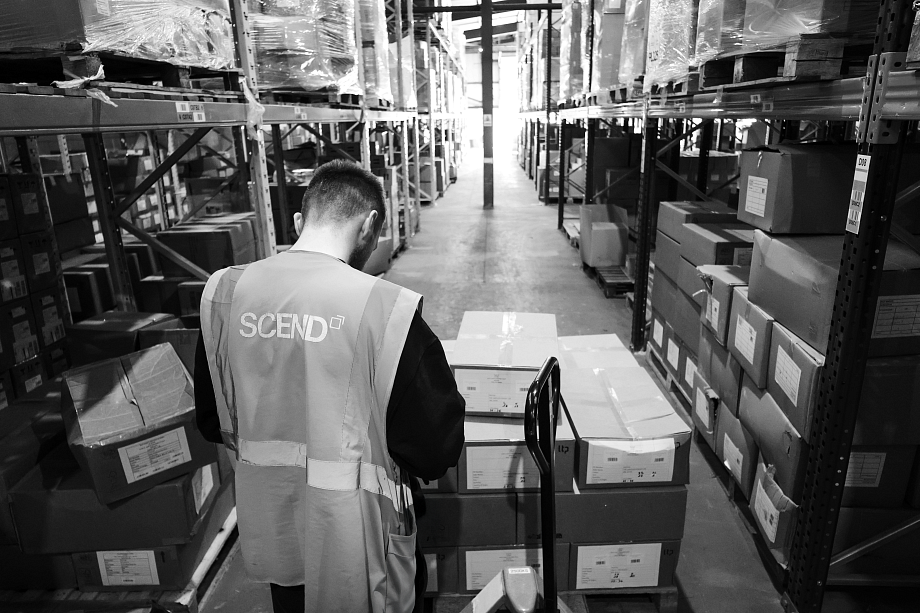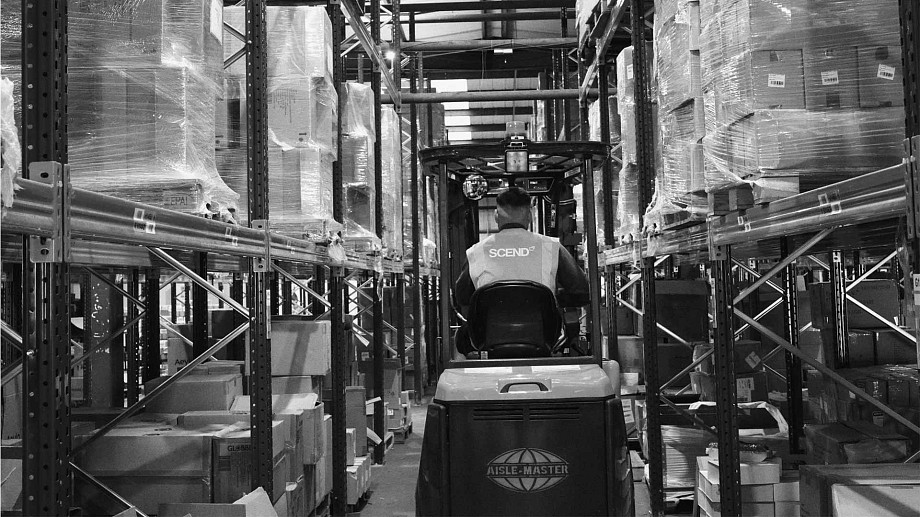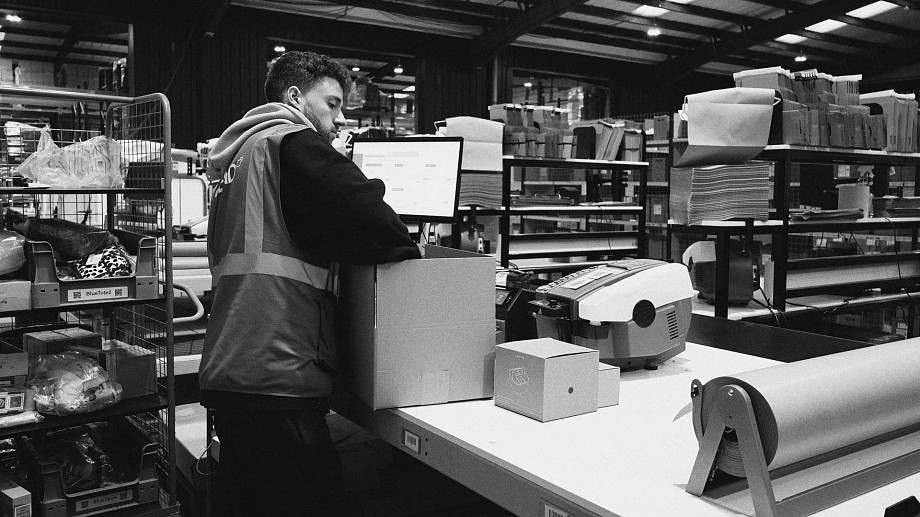In the fast-paced world of online retail, eCommerce fulfilment services play a crucial role. As a direct influencer of customer satisfaction, brand reputation, and growth potential. An effective fulfilment partner manages everything from receiving and storing stock to picking, packing, and delivering orders, providing an end-to-end solution that keeps your business moving forward. An effective fulfilment partner manages the logistics that keep businesses running smoothly, and provides an optimised end-to-end solution which keeps brands moving in the right direction.
A great fulfilment service does more than ship products. It ensures customers get their orders when promised, in perfect condition, and with minimal hassle. Achieving that requires a careful balance of several components:
- Goods in, inventory management and storage & warehousing. These key beginning steps help to ensure you’ve got the right foundations, helping to prevent stockouts and reduce storage costs.
- Order fulfilment, pick, pack and dispatch. Potentially the most important aspect to any eCommerce fulfilment solution, dealing with the day-to-day of picking, packing, and shipping products efficiently, accurately and with lightning speed.
- Delivery services and courier selection. These must meet diverse customer needs. Offering multiple shipping options is essential, and fast next-day delivery options will help your brand stand out in a crowded eCommerce marketplace.
- Technology integration and green fulfilment processes. Used to streamline operations and provide a cleaner, more environmentally friendly solution, the right technology enhances efficiency, accuracy and reduces the need for paper trails throughout the fulfilment process.
Throughout this guide, we’ll explore each of these components in detail so you can identify what to look for in a partner and how the right choice can transform your business operations.

Understanding eCommerce Fulfilment Services
At its core, eCommerce fulfilment is the behind-the-scenes infrastructure that ensures customers receive their orders exactly as expected. These services handle the logistical chain from storing your products to delivering them to doorsteps.
With a shared primary aim of ensuring customer satisfaction, a good 3PL will ensure timely and accurate deliveries, enhance a brand’s reputation, and secure repeat buyers.
An effective fulfilment service incorporates several essential components. These components work in harmony to support business operations, including:
- Warehousing and storage to keep inventory safe and organised.
- Order processing to prepare purchases for dispatch.
- Shipping and delivery to meet customer timelines.
- Returns management to maintain trust and loyalty.
Done well, eCommerce fulfilment does more than keep operations running; it builds a brand’s reputation for reliability. Customers who receive orders quickly and without errors are far more likely to shop again, recommend you to others, and become loyal supporters.
The most successful businesses choose fulfilment providers that align closely with their goals, offer transparency in operations, and can adapt to growth or seasonal demand shifts.
The Core Components of a Great eCommerce Fulfilment Service
A high-performing eCommerce fulfilment system is a lot like a well-rehearsed orchestra; each section plays a different role, but together, they create a flawless performance. A complex system which is designed around the following key components:
- Inventory management – Ensuring the right products are in stock and ready to ship.
- Order processing – Picking, packing, and preparing orders with accuracy and care.
- Delivery services – Meeting customer expectations for speed, reliability, and choice.
- Returns management – Handling returns smoothly to keep customers confident.
Technology underpins all of these core components, automating processes and providing real-time data to reduce errors, increase efficiency, and make scaling easier.
When these areas work seamlessly together, the result is a fulfilment process that supports business growth, enhances customer experience, and makes operations easier to manage.
Inventory Management: The Backbone of Fulfilment
Inventory management is the cornerstone of a sound fulfilment strategy. It keeps track of products, helps prevent shortages, and controls storage costs. Without accurate, up-to-date stock information, you risk overselling, understocking, or wasting resources on unnecessary storage.
Key practices include:
- Monitoring stock levels constantly – so you can replenish before you run out.
- Forecasting demand – to plan ahead for sales peaks and avoid overbuying.
- Maintaining ideal storage conditions – to keep products in perfect condition.
Modern inventory systems can automate stock updates, flag low levels, and even predict demand based on historical data. This prevents costly mistakes and ensures your customers always get what they ordered, when they ordered it.

Order Fulfilment: From Picking to Packing to Shipping
Order fulfilment is where your business’s promises are put to the test. It involves three key stages pick and pack and delivery, each needs to be strategically synchronised and plays a pivotal role in customer satisfaction:
- Picking – locating the correct items in the warehouse. Accuracy here is vital.
- Packing – protecting products for safe transport while minimising waste.
- Shipping – getting the order out the door quickly and via the right carrier.
A robust fulfilment service works in tandem with all of these processes to create a streamlined process. Automation tools like barcode scanners and order management software can reduce errors and speed up these processes. Equally important is communication; sending customers tracking updates keeps them informed and builds trust.

Delivery Services: Meeting Customer Expectations
Delivery is the final touchpoint in the eCommerce fulfilment process. This final stage bridges the gap between the business and the customer. Often, the most memorable stage in a buyer’s journey it can shape a brand’s perception.
With fast, reliable shipping now being the expectation rather than a bonus, it is imperative that you offer variety and deliver on business promises.
An effective delivery setup offers:
- Multiple shipping methods – from standard to express to same-day.
- Real-time tracking – so customers can follow their order’s journey.
- Accurate delivery timelines – to prevent frustration and uncertainty.
Strategically located fulfilment centres can cut delivery times and costs, improving customer satisfaction and making your business more competitive.
Technology and Integration: Streamlining Your Operations
Technology is the backbone of modern eCommerce fulfilment. From inventory tracking to shipping label generation, the right tools save time, reduce errors, and give you visibility across the entire operation.
Key technologies include:
- Warehouse Management Systems (WMS) – for real-time stock tracking.
- Order Management Software (OMS) – to streamline processing.
- Automated Packing Systems – to speed up dispatch.
Integration between your eCommerce store, warehouse, and carriers creates a single, centralised hub for information. This not only makes day-to-day operations smoother but also allows you to scale without losing control.
Scalability: Supporting Your Business Growth
A scalable eCommerce fulfilment service grows with you. Whether you’re doubling order volumes during peak season or expanding into new markets, your fulfilment operations should be able to handle the increase without delays or quality drops.
Key elements of scalability include:
- Flexible warehouse space.
- The ability to process higher-order volumes quickly.
- Access to extra staff and resources when needed.
This adaptability allows you to seize opportunities, like flash sales or international expansion, without the stress of overloading your systems.
Transparency and Reporting: Gaining Full Visibility
Transparency is crucial in eCommerce fulfilment. You need to know exactly what’s happening with your inventory and orders at any given moment.
A transparent provider offers:
- Real-time order tracking – for both you and your customers.
- Detailed inventory reports – to help with forecasting and budgeting.
- Clear shipment updates – to resolve issues quickly.
Comprehensive reporting turns raw data into actionable insights, helping you fine-tune processes and improve performance over time.
Cost-Effectiveness: Maximising Value Without Compromise
Cost-effectiveness in eCommerce fulfilment isn’t about finding the cheapest provider, it’s about getting the best value for the service you need.
Important considerations include:
- Competitive shipping rates.
- Efficient storage solutions.
- Transparent pricing with no hidden fees.
A cost-effective partner balances affordability with quality, ensuring you save money in the long run without sacrificing customer satisfaction.
Location and Global Reach: Expanding Your Market
Where your fulfilment centres are located can significantly affect shipping costs and delivery times.
Consider:
- Proximity to your main customer base.
- Access to major transport networks.
- Capability for international shipping.
A global fulfilment network allows you to serve new markets efficiently, manage customs processes, and keep delivery times competitive.

Customer Service and Returns Management
Great customer service doesn’t end at checkout. Your eCommerce fulfilment partner should provide prompt, helpful support for both you and your customers.
Returns management is equally important. A smooth, simple returns process encourages repeat purchases and builds trust. Look for:
- 24/7 support availability.
- Clear, easy-to-follow return instructions.
- Fast processing of refunds or exchanges.
A hassle-free returns policy can actually strengthen your brand reputation, showing customers you care about their experience even after delivery.

Security and Sustainability in Fulfilment
Security in eCommerce fulfilment means protecting both physical stock and customer data. This includes warehouse security measures and data protection protocols.
Sustainability is becoming a deciding factor for many consumers. Consider partners who:
- Use recyclable or compostable packaging.
- Optimise delivery routes to cut emissions.
- Operate energy-efficient facilities.
A commitment to sustainability can strengthen your brand image and appeal to eco-conscious shoppers.
Customisation and Value-Added Services
Customisation helps you stand out. Value-added services like kitting, gift wrapping, or branded packaging can enhance the unboxing experience.
Examples include:
- Including personalised thank-you notes.
- Creating product bundles.
- Adding custom inserts or promotional material.
These touches can turn a simple delivery into a memorable moment, boosting customer loyalty.
How to Choose the Right eCommerce Fulfilment Service for Your Business
When choosing a fulfilment partner (3PL), assess:
- Scalability – can they grow with you?
- Technology integration – do they connect with your sales platforms?
- Geographical reach – can they deliver where your customers are?
- Cost structure – is pricing transparent and good value?
The right provider will feel like an extension of your business, not just a vendor.
Common Mistakes to Avoid When Selecting a Fulfilment Partner
Avoid these pitfalls:
- Choosing on price alone.
- Skipping due diligence.
- Ignoring technology compatibility.
Taking the time to research and compare options will pay off in smoother operations and happier customers.
Key Takeaways and Next Steps
eCommerce fulfilment is more than logistics; it’s a strategic asset. The right partner can improve customer satisfaction, streamline operations, and free you to focus on growth.
Next steps:
- Evaluate your current fulfilment process.
- Research providers who align with your needs.
- Prioritise scalability, transparency, and technology.
When done well, fulfilment isn’t just about delivering products — it’s about delivering a brand experience that keeps customers coming back.


















